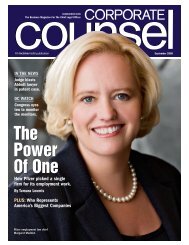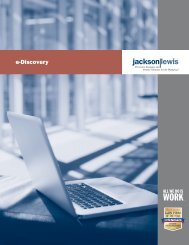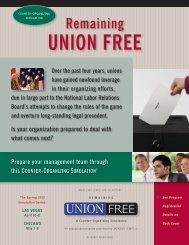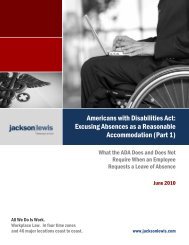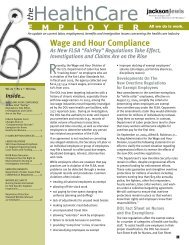Think Global, Act Local - Jackson Lewis
Think Global, Act Local - Jackson Lewis
Think Global, Act Local - Jackson Lewis
Create successful ePaper yourself
Turn your PDF publications into a flip-book with our unique Google optimized e-Paper software.
THINK GLOBAL, ACT LOCAL<strong>Jackson</strong> <strong>Lewis</strong> LLPFrom responsibility statements to policies and practices, in-house counsel will likely come underincreasing pressure to ensure their companies comply with the labor relations imperatives ofthe ILO and Guiding Principles. In addition, labor unions have amassed tremendous leverage intheir efforts to organize domestic operations of transnational enterprises. Organized labor’sobjectives of attaining neutrality agreements, card check recognition, unfettered access toemployees and speedy first contracts find support in the international standards and fromforeign parent corporations accustomed to dealing with greater worker and union rights inbusiness operations.Although the subject of transnational labor organizing is not specifically addressed in the ILOconventions or the free trade agreements cited by Professor Charnovitz as forming part of the“ILRA,” a number of ongoing union organizing campaigns are using international labor relationsstandards as a key piece of their corporate campaign strategy. US subsidiaries of foreign parentcorporations in a range of businesses — from retail to food distribution to telecommunications— are under pressure from various alliances of domestic and foreign labor unions protestingmanagement opposition to organizing as a violation of those standards.One example is the ongoing effort by the United Food and Commercial Workers Union (UFCW)to organize US workers of a grocery store chain owned by a parent in the United Kingdom. TheUS stores’ managers have been accused of refusing to meet with the union to discussrepresenting their employees. The UFCW uses the parent’s corporate policy statements,reflecting its founding member status of the Ethical Trading Initiative, that specifically pledgeallegiance to the ILO’s conventions on freedom of association and the right to organize and tocollective bargaining to indict US management for refusing to meet with the union. Augmentingits US campaign through social media and online channels, the union recently began usinghighway billboards in areas of California where the corporate campaign is focused.In 2008, the UFCW launched a campaign in the United Kingdom to put public pressure on thecompany to conform its labor relations policies “at home” and in the United States. Announcingthe campaign in Britain, the UFCW said, “The *report+ is a damning indictment of how *thecompany] operates different principles at home and abroad. The report also highlights whatUFCW believes are stark contrasts between what *the company+ says and what it does.” 13In the telecommunications industry, another ongoing corporate campaign has pitted the foreignparent corporation against the efforts of US management lawfully to defend against organizingefforts by the Communications Workers of America.These examples illustrate some of the ways that international labor relations standards areshaping the growth and conduct of transnational enterprises. They go beyond speculation as tothe weight of influence the principles of the ILO and UN are having in the development of aglobal standard for cross-border human rights and labor relations.P A G E | 5




